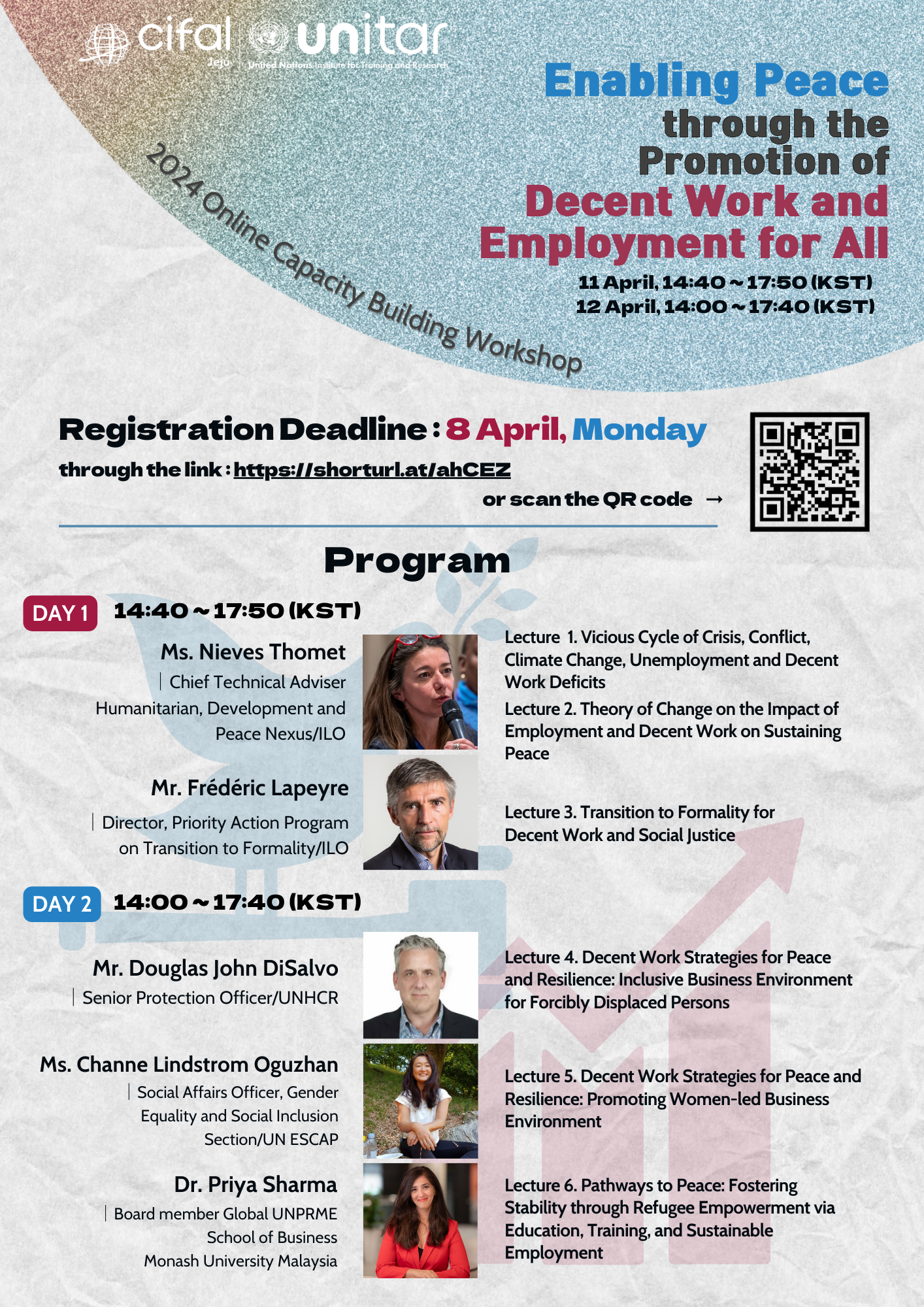
 2024.03.21
2024.03.21
|
Enabling Peace through the Promotion of Decent Work and Employment for All
11 April, 14:40 ~ 17:50 (KST) 12 April, 14:00 ~ 17:40 (KST)
Organized by UNITAR CIFAL Jeju/JITC
Background Reflecting on the events of 2023, the international community witnessed ongoing struggles among vulnerable populations amidst conflicts such as wars in Ukraine and Gaza and Israel. Concurrently, there were continuous heatwaves, droughts, wildfires, and floods. Many countries also grappled with societal discontents, marked by polarization, violent protests, riots, and strikes. The Global Risks Report 2024 by the World Economic Forum underscores an increasingly precarious landscape of economic, geopolitical, and societal vulnerabilities. According to the Global Risks Perception Survey 2023-2024 featured in the report, respondents anticipate a negative outlook over the next decade, with 63% foreseeing turbulent conditions and less than 10% expecting stability[1].
Within the complex array of global risks identified so far, a notable pattern emerges: the vicious cycle of crisis, conflict, climate change, unemployment, and gaps in decent work[2]. This interconnectedness reveals that violent conflict, climate-related risks, and disasters are intertwined with unemployment and lack of decent work opportunities. As highlighted by the ILO, these risks can significantly impede and reverse sustainable economic progress, affecting the availability and quality of employment opportunities, which in turn leads to a rise in informal, non-contractual, and unregistered employment particularly among youth and women[3]. This can inadvertently sustain the informal economy which is linked to significant deficiencies in decent work opportunities. Moreover, unemployment and decent work deficits can themselves act as primary causes for conflict. For instance, violations of fundamental labor rights, unequal economic opportunities, or the absence of social dialogue can fuel grievances and precipitate conflict.[4]
Despite efforts and progress towards leaving no one behind, the global community grapples with significant challenges: nearly 2 billion people still reside in fragile and conflict-affected environments while sustainable livelihoods continue to be disrupted and harmed by various crises.[5] This exacerbates vulnerability, inequality, and social exclusion in these areas. The ILO stressed in its Centenary Declaration for the Future of Work adopted in 2019 that decent work is essential for sustainable development, addressing income inequality, and eradicating poverty, especially in areas affected by conflict, disaster, and other humanitarian crises.[6]
In low- and middle-income countries, a significant portion of individuals and small enterprises operate beyond the reach of government oversight, leaving them with scant assistance during emergencies such as pandemic, climate-related disasters, and armed conflicts. This lack of support makes it increasingly challenging to ensure decent work for all, particularly placing those in the informal sector[7] in even more precarious positions and complicating the transition to formality. The informal sector, which accounts for over 70 percent of total employment and roughly one-third of output in these less developed countries, heavily relies on family members and moneylenders for working capital, leaving them susceptible to sudden income disruptions.[8] This inevitably exposes informal workers, who are predominantly women and often young and low-skilled, to heightened vulnerabilities. Specific attention is also necessary for populations affected by conflict, climate change and disasters, commonly referred to as ‘forcibly displaced persons,’ as humanitarian crises have become more protracted. Policy makers have long been concerned about these at-risk demographics since they are already vulnerable even under normal circumstances.
The varied roles, responsibilities, needs, and activities of these vulnerable groups lead to different experiences of crisis impacts, necessitating approaches tailored to specific contexts to ensure fair employment and stable work opportunities. It is also important to empower women for their sustainable economic activities, allow youth to be part of governance systems to make their voice heard, and develop market-based livelihoods strategies for peace and prosperity among both displaced persons and local host communities.
Against this backdrop, UNITAR CIFAL Jeju will organize a capacity-building workshop aimed at rethinking the concept of decent work and employment in sustaining peace. The workshop will explore proactive and strategic approaches to employment planning for peace and resilience. It will begin by examining the dynamics of peace and conflict and their interaction with issues of decent work. The workshop will also delve into context-specific theories of change[9] regarding how employment and decent work can contribute to peacebuilding. It will discuss aspects such as fostering an enabling inclusive business environment, empowering women-led small and medium-sized enterprises, and facilitating transition from the informal to the formal economy. Additionally, the workshop will feature country experiences in job creation for peace and resilience.
The objective of the workshop is to enable participants to deepen their understanding of how decent work and employment can sustain peace. Furthermore, it aims to equip them to contribute to policymaking by drawing insights from local cases specific to their contexts regarding job creation for peace and resilience.
----------------------------------------------------
[1] World Economic Forum (2024), The Global Risks Report 2024, available at https://www.weforum.org/publications/global-risks-report-2024/ [2]ILO & DPPA (2021), Sustaining Peace through Decent Work and Employment, available at https://www.ilo.org/beirut/publications/WCMS_771498/lang--en/index.htm [3]Ibid. [4]Ibid. [5]United Nations (2022), The Sustainable Development Goals Report 2022 [6]ILO (2019), ILO Centenary Declaration for the Future of Work [7]Distinguishing the concepts: the informal sector, informal employment and the informal economy from the ILO (https://www.ilo.org/global/topics/wages/minimum-wages/beneficiaries/WCMS_436492/lang--en/index.htm) - Informal sector – defined as a group of production units comprised of unincorporated enterprises owned by households, including informal own-account enterprises and enterprises of informal employers (typically small and non-registered enterprises). - Informal employment – defined as “all remunerative work (i.e. both self-employment and wage employment) that is not registered, regulated or protected by existing legal or regulatory frameworks, as well as non-remunerative work undertaken in an income-producing enterprise. Informal workers do not have secure employment contracts, workers’ benefits, social protection or worker’s representation. - Informal economy encompasses both informal sector and informal employment, and is defined as all economic activities by workers and economic units that are – in law or in practice – not covered or insufficiently covered by formal arrangements. [8]World Bank(2022), The Long Shadow of Informality – Challenges and Policies, available at https://www.worldbank.org/en/research/publication/informal-economy
[9]A theory of change is a method that explains how a given intervention, or set of interventions, are expected to lead to a specific development change, drawing on a causal analysis based on available evidence. It is focused in particular on mapping out or “filling in” what has been described as the “missing middle” between what a program or change initiative does and how these lead to desired goals being achieved.
Event objectives - To provide a platform for gaining insights into pathways to sustaining peace and resilience through decent jobs and employment - To take stock of peace and conflict dynamics and their interactions with decent work and employment alongside strategic approaches to transition from the informal to the formal economy - To share community, city, or country-level experiences in relation to creating jobs for enabling peace and resilience
Expected outcomes - Better understanding of the vicious cycle of crisis, conflict, climate change, unemployment and decent work deficits - Getting familiar with theories of change for mapping out how interventions related to decent work and employment can lead to desired goals for sustaining peace - Gaining insights into employment planning strategies that can be adapted to the contexts and needs of each locality
Target audience
This training is open to those from the Asia Pacific region – governments, NGOs, CSOs and private sectors, who have been engaged in tasks for sustainable development in line with SDG 8(Decent Work and Economic Growth) and SDG 16(Peace, Justice and Strong Institutions).
Methodology The workshop consists of: - Expert-led lectures - Community/City/Country-level case study sharing
- Individual assignments
Organizer: UNITAR CIFAL Jeju/Jeju International Training Center
Date & Time: 11 April, 14:40 ~ 17:50 (KST) & 12 April, 14:00 ~ 17:40 (KST)
Venue: Online (Zoom)
Program contents and structure
Registration deadline 
Please register by April 8, 2024 (Monday) through the following link, https://shorturl.at/ahCEZ or scan the QR code on the right side.
Certificate UNITAR and UNITAR CIFAL Jeju/JITC will issue a certificate of completion to only those who have attended all sessions and submitted an individual assignment.
For further inquiries, please contact
United Nations Institute for Training and Research (UNITAR) Centre International de Formation des Autorités et Leaders (CIFAL) UNITAR CIFAL Jeju Sunhee CHO, Senior Program Officer
Tel 82 64 735 6574 / Email cho503.jitc@gmail.com or shcho.jitc@cifaljeju.org |
||||||||||||||||||||||||||||||







